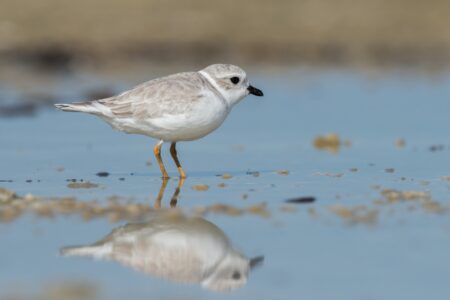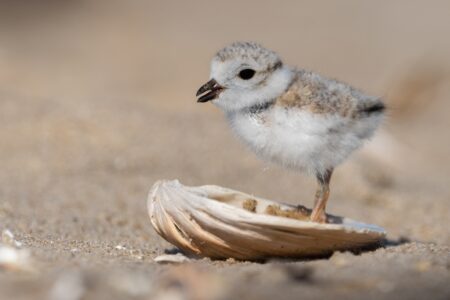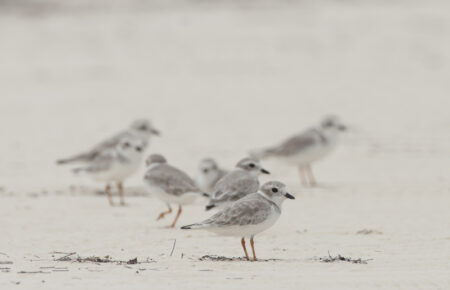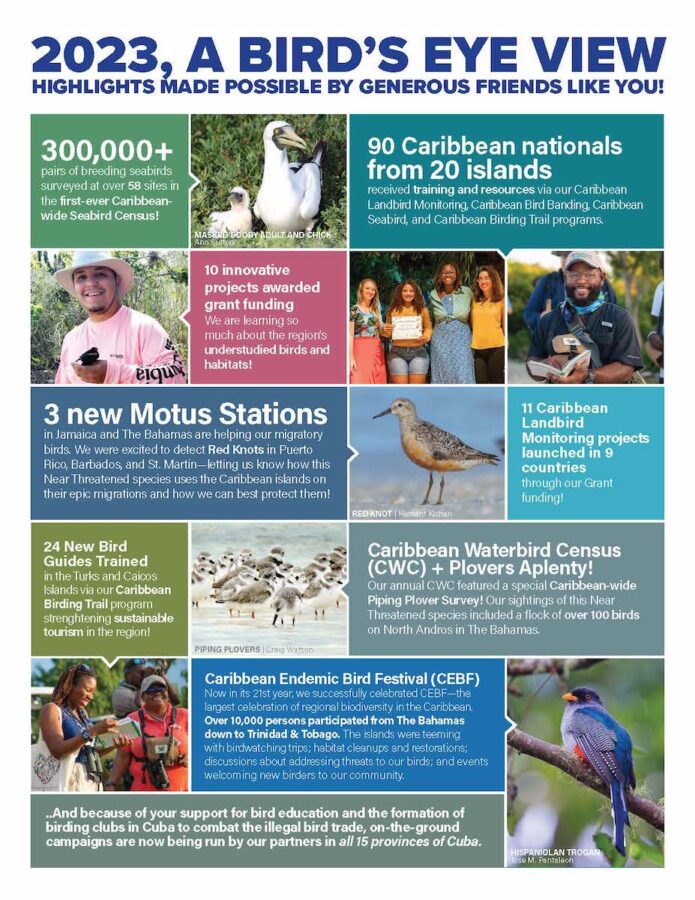BirdsCaribbean switched into top gear for 2023. With a lot of ground to cover, we were quickly up and running! Here are some of the highlights of the year…
Focus on one adorable but elusive waterbird…
Our Caribbean Waterbird Census (CWC) region-wide count, from January 14 to February 3 2023, included an ‘added’ Caribbean-wide Piping Plover survey. This species is listed as “Near Threatened” by the IUCN with an estimated global breeding population of just 8,400 birds. The search was enhanced by beautiful graphics and merchandise by Josmar Esteban Marquez. Sightings were tracked live and plotted on a map. During the survey, these attractive but vulnerable birds were spotted in The Bahamas (a great success!), the British Virgin Islands, and Puerto Rico. Word of our search spread far and wide and we also received sightings from the Caribbean coast of Mexico! Please continue to keep a sharp eye open for these small, round birds, which are often seen in small flocks on sand flats and might also be found in mangroves, mudflats, and other shoreline areas.
During CWC 2023, an abundance of waterbirds were spotted across the region by diligent birders, young and old, as they kept their eyes peeled for the elusive Plover! Some of the wonderful waterbirds seen on our 2023 census included a white-morph Great Blue Heron on Bonaire (a rare sight outside Florida and Cuba); a diverse gathering of shorebirds on Cuba (including Dunlins, Sanderlings, Short-billed Dowitchers, Least and Western Sandpipers, Semipalmated and Wilson’s Plovers and many others); and and some ducks enjoying some winter sun on Jamaica (including Green-winged Teals, Ring-necked Ducks, and Lesser Scaups).
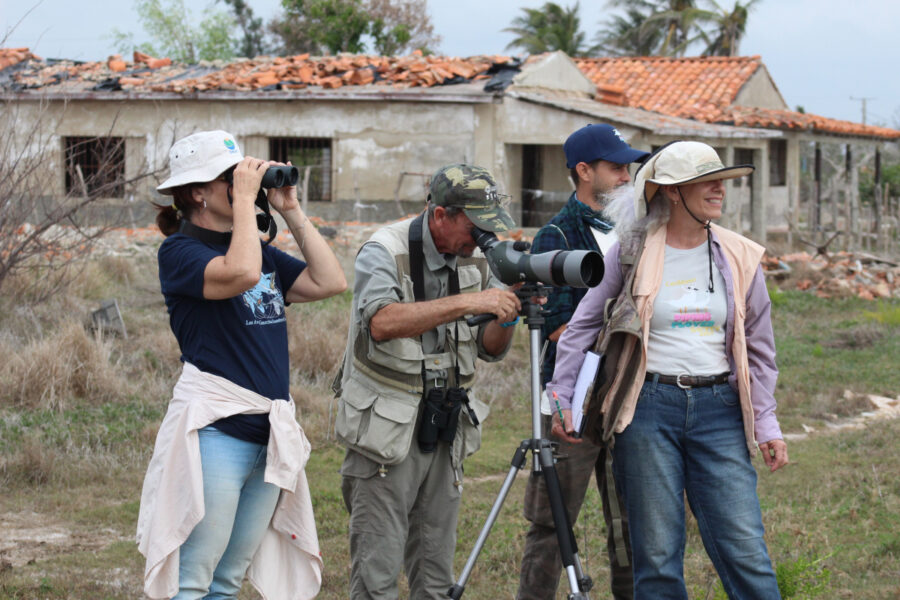
Looking for landbirds…
After the volcanic eruption of April, 2021, St. Vincent’s landbirds, especially two vulnerable endemic species, the threatened St. Vincent Parrot, and endangered Whistling Warbler, faced new dangers—both in the short and long term. We thought it fitting to continue building the capacity of Caribbean conservationists to identify and monitor landbirds using standardized survey protocols.
Thanks to funding from the Critical Ecosystems Partnership Fund (CEPF), the United Nations Development Programme (UNDP), and BirdsCaribbean members, partners and donors, we organized a Landbird Monitoring Workshop on St. Vincent with 24 participants, including from neighboring islands (Grenada, St. Lucia, and Montserrat).
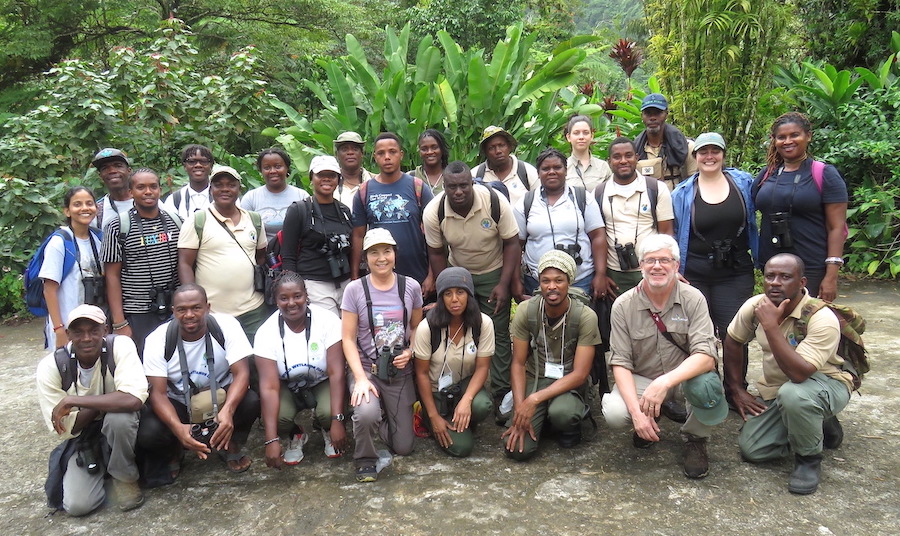
We are steadily building out another part of our landbird monitoring activities: the Motus Wildlife Tracking System, launched in 2021.
In 2023, we worked with the Bahamas National Trust to install two new stations in Grand Bahama’s National Parks. We still need your help in identifying sites for new Motus stations, to help us expand our network and to learn more about the comings and goings of our wonderful birds across the region and the Americas.
We were out and about again! Celebrating our beautiful endemics
Did you know we now have 180 endemic birds in the Caribbean region? And we celebrated these one-of-a-kind birds during our Caribbean Endemic Bird Festival (CEBF) from April 22 to May 22, 2023—with a special emphasis on water conservation. What would our birds (and we humans) do without water? With the increased heat (it was a very hot summer) we may have seen our birds drinking at bird baths—they get thirsty like we do! With the climate change crisis pressing on us, this was a very important theme to emphasize, and our partners across the region took it on enthusiastically.
In 2023, the CEBF once again hosted in-person events and the response was tremendous—over 10,000 persons participated from The Bahamas down to Trinidad and Tobago! Our citizen scientists of all ages were out in numbers, with mangrove explorations, BirdSleuth Caribbean’s learning activities, school visits, habitat cleanups, art workshops, a birding for kids excursion, and even a floating classroom field trip!
On the Caribbean Birding Trail in Turks and Caicos
As the year-end drew closer, discovery, learning, and empowerment were words that came to mind during the Caribbean Birding Trail (CBT) Interpretive Guide Training Workshop in Turks and Caicos Islands, which took place from October 23 to 27, 2023. Twenty-four participants were trained in the Islands’ beautifully unique environment during an intensive five-day workshop. The trail now includes 138 birding sites and ten hotels and eco-lodges in 24 countries—all combining amazing birding experiences with learning and information on ecosystems, cultural and natural heritage, and more.
This was our seventh CBT training. We are deeply thankful to our Turks and Caicos sponsors—the Sandals Foundation, the Turks and Caicos National Trust, Darwin Plus Initiative, the Turks and Caicos Department of Environment and Coastal Resources, the Royal Society for the Protection of Birds, Marshall Reynolds Foundation, Shika Shika, and Vortex Optics.
Bonding over Bird Banding! Workshop #2 in the Dominican Republic
Bird banding is an essential component of birding science worldwide. It is a complex and technical issue that requires longer training sessions. We returned to the Dominican Republic again in March of last year (the location of this year’s International Conference), continuing our work of nurturing a committed community of trained banders. The response from our highly intelligent group of trainees was enthusiastic.
Caribbean bird banders have gone abroad!
We sent some of our bird banders off to the United States and Brazil for immersive banding experiences. The interns reported back to us (Grenadian Zoya Buckmire at Klamath Bird Observatory in Oregon, Puerto Rican Dayamiris Candelario at Willistown Conservation Trust in Pennsylvania) on their exploration of new landscapes, new ecosystems—and, of course, new birds! We would like to thank all our partner organizations and generous donors who supported these internships. Once again, we were happy to add new dimensions to our young trainees’ experiences, so they may return to their countries to establish new programs and projects. Empowerment is key!
Seabirds under pressure
Despite a range of challenges, our dynamic Seabird Working Group has been addressing the critical state of Caribbean seabirds for some time now. The first-ever Caribbean-wide Seabird Census is ongoing, for 2023 and 2024. Over 300,000 pairs of breeding seabirds have already been counted at over 58 sites! Caribbean seabirds, like those in other areas of the world, are threatened by human activities—including pollution (especially plastics), climate change, invasive species, and unsustainable fishing practices. The Census continues! Please contribute your thoughts and findings, watch the webinar updates, and follow the admirable work of our Seabird Working Group this year!
More direct funding for research and conservation work!
From combating the illegal bird trade in Cuba, to surveys of our most endangered endemic Caribbean hawk in Haiti, thanks to our grant awards, 10 innovative new projects are helping us to protect and learn more about the region’s understudied birds and habitats! Stay tuned for our upcoming blogs sharing exciting project results and accomplishments.
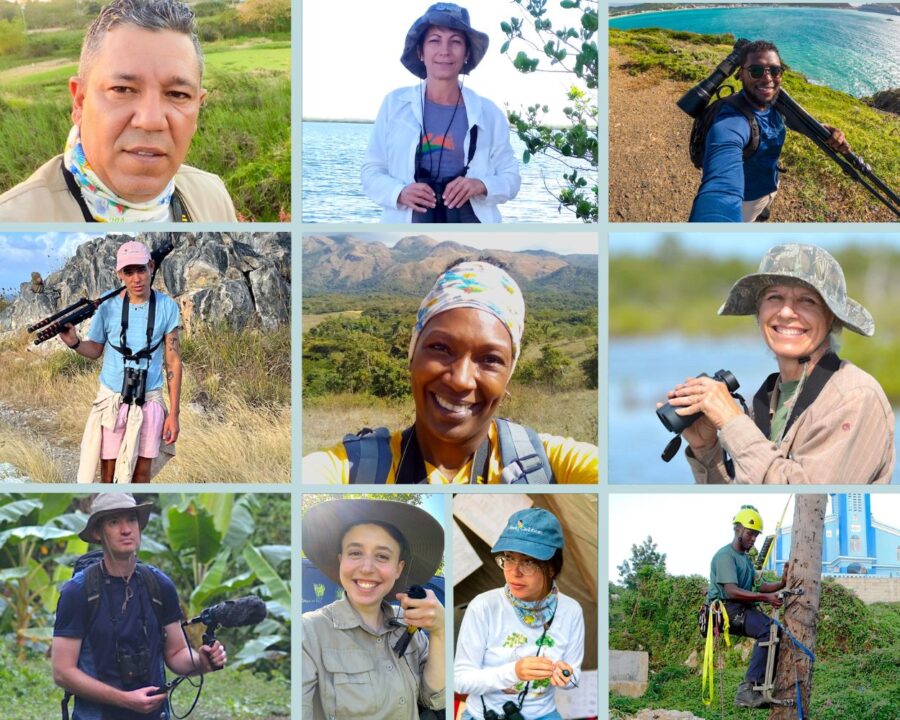
Have we forgotten something? Oh, yes…
Last but by no means least, Global Big Day 2023 was another huge success, with increased numbers of Caribbean birders participating. Our region saw more birds (a total of 515 species) and more humans (511 posting on eBird) than on any other Global Big Day. Once again, competition among our teams was heated—and once again, our Executive Director Lisa Sorenson’s multinational “Flying Pintails” dominated! Hmmm…
NOTE: Please remember to record ALL your bird sightings, whether in your backyard or out on a birding excursion, on eBird Caribbean via their website or phone app. Your bird notes make a difference in helping scientists identify the “what, when, how many, and where” of our region’s birds!
Networking is key…
As you can see, building and strengthening networks across the region has always been a significant part of our work, and it was the same in 2023. Our network of scientists (including citizen scientists), students, educators, non-governmental and community organizations, as well as nature-friendly companies and government entities, continues to grow.
In addition to the Caribbean Bird Banding Network, the Caribbean Motus Collaboration, and the Caribbean Landbird Monitoring Network, we are also building a vibrant group of trained interpretive guides through the Caribbean Birding Trail. This person-to-person aspect of our work is important for knowledge-sharing, interaction, and “comparing notes” with each other. A great deal of teamwork goes into all these endeavors, as you can see from our reports. All of this creates a positive and nurturing environment. We have great faith in our newly-trained Caribbean citizens, who are both enthusiastic and action-oriented. They want to see progress and improvements for our wonderful birds and their habitats.
We look forward to keeping in touch with you all! Here’s to 2024!
A huge thank you to all of our members, partners, and donors. This work would not be possible without your dedication, passion, hard work, and financial support.

